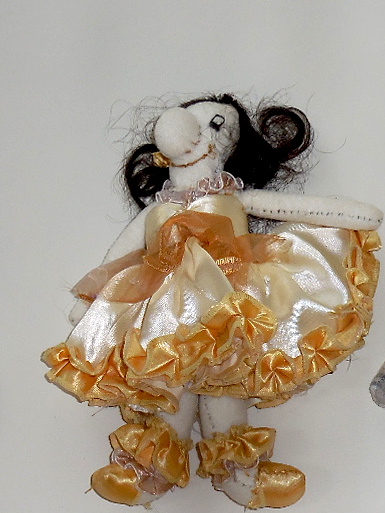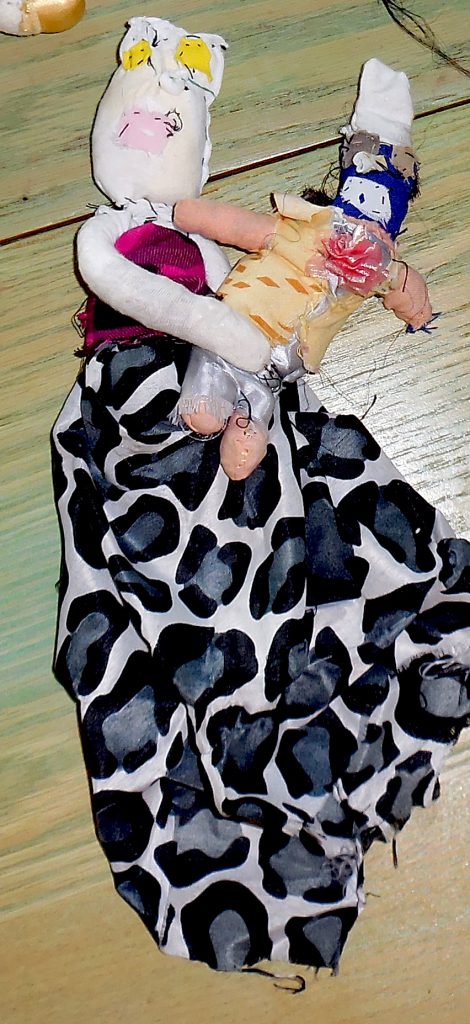Neither Barbie nor the Transformers has much market share in a place like Zimbabwe, where a teacher would have to work for a month to afford the most minimal of Mattel’s offerings, where unemployment tops 90 percent, and half the population is on the verge of hunger.
Yet even in such dire circumstances, kids will be kids – and Zimbabwe’s sort through the detritus of towns and cities for Vaseline jar caps and shoe polish lids, for pieces of wire, discarded buttons, scraps of cloth and bits of yarn that became their dolls, their cars, their fantasies.

Awed by their imagination and spirit, in 2005, Dennis Gaboury, an American sculptor spending the year in Bulawayo, Zimbabwe’s second largest city, sponsored a competition among the city’s orphans to encourage and reward their creativity. More than 250 boys and girls built dolls and trucks, motorcycles, airplanes and helicopters. And in the Spring of 2006, at a special awards show, the children all received prizes – movie tickets and backpacks, beans and pencils, courtesy of local and international donors. Their toys were displayed in an exhibition mounted at the National Gallery, and the top four toymakers garnered something even more spectacular – an airplane ride over their own hometown.


The orphans gained more than their prizes and their moment in the spotlight: When Dennis took a sampling of the toys home to New York, dozens of his friends and neighbors reached out with a helping help by donating money for the toymakers. Dennis used those donations to pay school fees and to buy baskets of food sufficient to feed a family for a month, as well as notebooks and pencils. For the first time in their lives, the children glimpsed the possibility of helping their families by working with their own hands. In a world where charity and handouts are the coin of the realm, they caught an inkling of dignity.
What began as a one-time competition morphed into an annual happening and Dennis not only continued to provide food to orphans from across the city but rewarded the best toy makers from each neighborhood with a train trip to Victoria Falls and, in the Spring of 2008, a week-long adventure to an outdoor camp in the Matopos Hills just outside Bulawayo.
In the course of these activities, Dennis teamed up with Tinashe Basa – and Zimkids was born. We have maintained our commitment to the dignity of work and independence and are now concentrating our efforts in one of Bulawayo’s poorest and most underserved neighborhoods, Pumula North, and on a growing group of orphans between the ages of three and eighteen.
While Gaboury began by working in 15 neighborhoods, he and Tinashe chose to target Pumula not only because of the magnitude of need in that community but because he feared Zimkids would become one of those large, impersonal NGOs he had learned, from experience spends a fortune on administrative costs and is not overly effective. Keeping it simple is his philosophy, as is recruiting the sort of people who understand the power of person-to-person connections.
Shortly after opening in Pumula North, Dennis turned the traditional form of governance – a Council of Elders – on its head in order to empower young people. The Zimkids Council of Elders would be composed of 14-18 year olds who would act as leaders in training, and they’ve taken on their roles with gusto, organizing and supervising activities ranging from a chess club and traditional dance, to sports and tutoring.
Dennis and Tinashe were soon joined by Adrian Suskin, a former Bulawayan living in Baltimore, Maryland, who had maintained contacts with his hometown, assisting many over the years with school fees, housing and food.
After operating in the yard of a local homeowner and then out of a neighborhood primary school for four years, in July 2012, we opened The Adrian Suskin Center, a complex built with funding from scores of individual, corporate, union and diplomatic donors. The construction crew was made up of six members of our Council of Elders, trained on the job by Dennis. It now includes an educational resource center with a kitchen, clinic, and library; a computer training center, a sewing training center; a welding training area: a pre-school; a market garden complete with drip irrigation; an obstacle course designed and built by the orphans; a playground; and sports fields.
In 2014, the staff of Zimkids, composed of orphans who grew up within Zimkids, decided to assist orphans in a settlement called Methodist about 8 kilometers away from our Center. On their days off, they meet voluntarily with another 100+ orphans, teaching them computer skills, gardening and welding, providing for their basic needs and assisting them medically.
An apolitical, non-religious charitable trust under Zimbabwean law, Zimkids receives U.S. tax deductible donations through Zimkids Orphan Foundation, a 501(c)(3) under American law.










